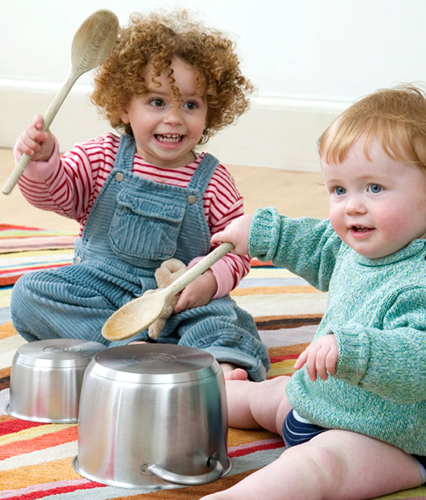Different kinds of play Physical and pretend
Toddlers are discovering
the sheer joy of using their bodies. This is a time for physical
play—running, jumping, skipping, and play fighting. Puppies, kittens,
and little humans all have a “play face” indicating this activity is
just for fun. Parents and their toddlers will develop their own
tickling, throwing, and hiding games, all accompanied by squeals of
delight and excitement.
Rough-and-tumble play is
common from three years on into adolescence. Children are very good at
differentiating between play fighting and real fighting. Rolling over
and wrestling games often find one toddler on top and then the other
having his turn as the victor. Unlike real fighting, neither one is
meant to get hurt and they are oblivious to onlookers, this is just for
each other.
Along with the enjoyment
of growing physicality, we see the first signs of pretend play. This
develops in an intricate sequence in which a one-year-old pretends to be
asleep or eating, much to her own amusement. By about 18 months she can
be seen feeding her teddy bear, or parent. At two years old, she might
be getting her doll to feed her teddy. The ability to use her
imagination to substitute objects for real things in play comes a little
later, so by three or four she may happily use an acorn shell as a cup.
A classic sign of this stage is the use of a stick or a block as a gun.
Parents can help with developing this imaginary play because it is
mostly social, and up to about four years, it is typically a
parent–child activity. There is a shared quality to it, with neither
parent nor toddler taking charge. In time, other children start to be
involved in the pretending, and the stories get more complicated,
following familiar themes such as cooking dinner or shopping.
Construction
Children love the challenges presented by toys to assemble: Completing them enhances self-esteem.
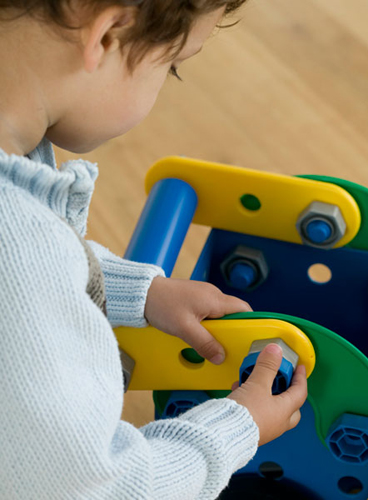
Family games
Playing with your child, perhaps developing your own physical games, is a great way of bonding.
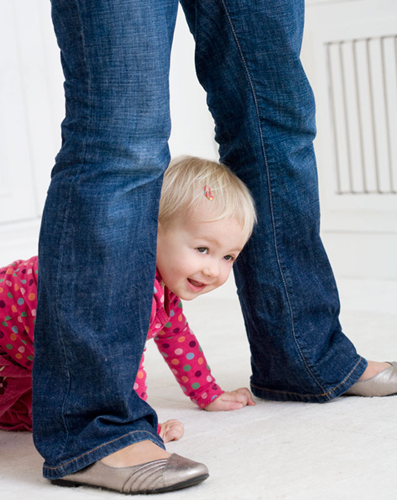
Let’s pretend
You will see more sophisticated role play, such as dressing up, emerge around three to four years of age.
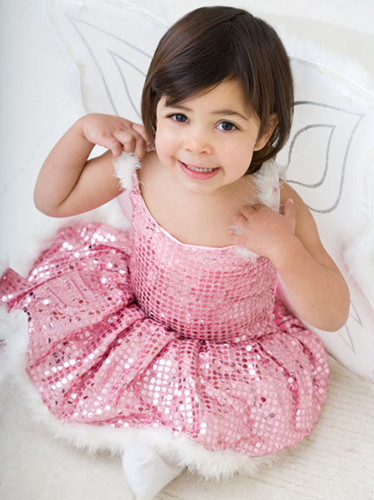
Does play aid development? I’m only playing…
Since the end of the 19th
century, play theorists have stressed the importance of play in
children’s development. Some think it’s more important for emotional
development, some for thought and creativity, and others still, for
mastering general life skills in a safe context. The most radical
theoretical position is that play has no ultimate developmental goal at
all: It is purely for fun, and the learning along the way is secondary
to the enjoyment of it. Some argue that play has been idealized in our
child-focused society, and point to other cultures where less emphasis
is placed on play with no detriment to children’s development.
Finding links
Modern theorists draw
links between both pretend play and creativity, and between role play
and social-skills development. There is some evidence to link pretend
play with greater creativity and fewer behavior problems. It is
difficult to separate learning from any aspect of a child’s development
and easy to see how physical play, pretend play, and language play offer
a multitude of opportunities for a child to learn what he can do, who
he is and how to interact with his family, friends, and environment.
Rough-and-tumble games that have no obvious rules or goals teach social
skills such as turn-taking, negotiation, and making and keeping friends.
They also teach competitive and cooperative skills. More complex,
goal-directed play such as construction, drawing, and puzzles, which
emerge in late toddlerhood, tend to develop a child’s cognitive skills
such as problem solving and hypothesis testing.
All children play, whether
they live in the Amazon jungle or first-world suburbia, whether they
have cupboards full of toys or a car made out of tin cans, and
significantly, despite how much emphasis and energy their parents invest
in their play. While the jury may still be out on what type of play and
how play is linked with cognitive, social, and emotional development,
what is indisputable is the profound link between play and the positive
experience of shared pleasure.
I’m a builder!
Role playing and dressing
up marks an important stage in your child’s development: It means he is
thinking about how other people see the world.
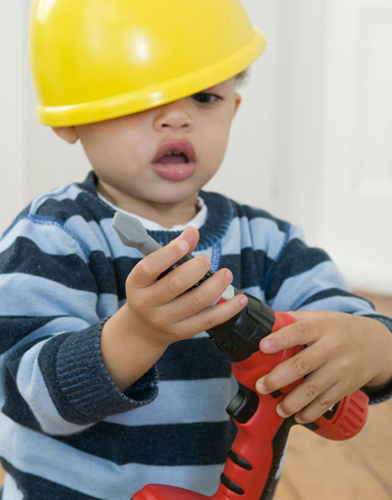
Noisy games
Your younger toddler will
love making a noise and mess with the contents of your kitchen. Create a
special cupboard full of safe implements such as pots, pans, and sturdy
plastic boxes for him to explore.
